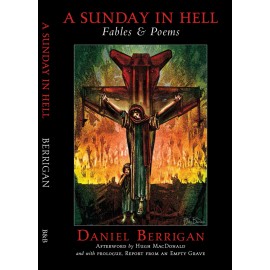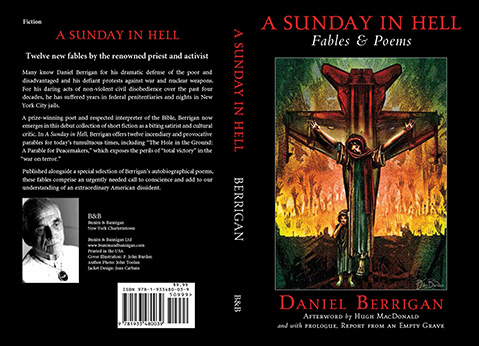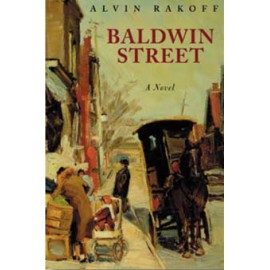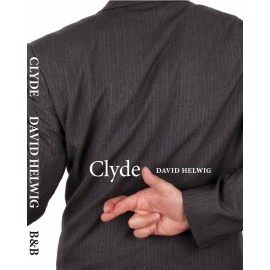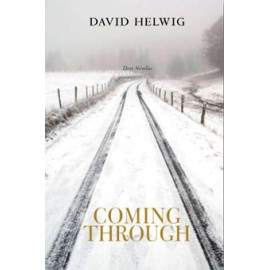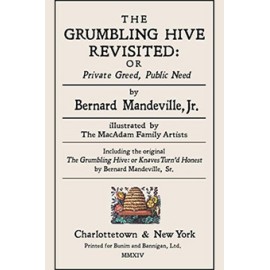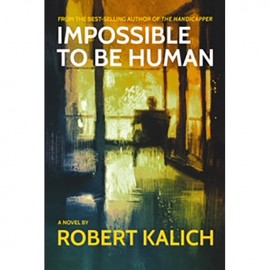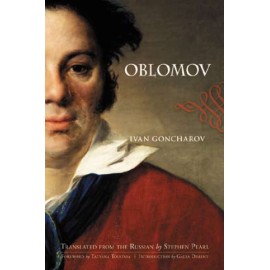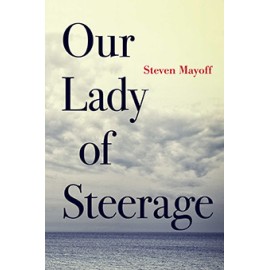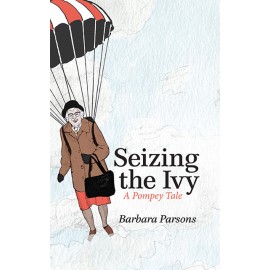Fiction
A Sunday in Hell - Fables & Poems
Product Code: 001
A Sunday in Hell - Fables & Poems
By: DANIEL BERRIGAN
Afterword: Hugh MacDonald
New fiction from a leading activist and peacemaker.
Many know Daniel Berrigan for his protests against injustice and war and nuclear weapons. For his acts of civil disobedience over the past four decades, he has suffered years in federal penitentiaries and nights in New York City jails.
A prize-winning poet and respected interpreter of the Bible, Berrigan now emerges in this debut collection of short fiction as a biting satirist and cultural critic. In A Sunday in Hell, Berrigan offers twelve provocative parables for today’s tumultuous times, including "The Hole in the Ground: A Parable for Peacemakers," which exposes the sinful wastefulness of war economies. Intermixed with a selection of Berrigan's poetry, these fables trouble our consciences and perhaps reveal a new aspect of a unique American dissident.
Daniel Berrigan is a Jesuit priest, poet, and peacemaker, has often been nominated for the Nobel Peace Prize. He has written more than fifty books, including studies of the Hebrew prophets and other books of the Bible, an autobiography, To Dwell in Peace, and many volumes of poetry, beginning with his prizewinning Time without Number. He is the author of The Raft Is Not the Shore (with Thich Nhat Hanh), The Geography of Faith (with Robert Coles); and a play, The Trial of the Catonsville Nine. And the Risen Bread: Selected Poems 1957–1997 was recently published by Fordham University Press. Hugh MacDonald (Afterword) is the poet laureate of Prince Edward Island. He has authored poetry, fiction, and literary anthologies.
Baldwin Street
Product Code: 002
Baldwin Street
BY: ALVIN RAKOFF
Leonard Abelson is one of seven children. He lives above Abelson’s Hardware on Baldwin Street in Kensington Market in Toronto. It’s the 1930s. Leonard’s father, Sam, a former merchant sailor who speaks fourteen languages, does the purchasing for the store; his mother, Pearl, a Ukranian émigré who was a victim of pogroms and marauding Cossacks after WWI, runs the shop floor.
Leonard wants to be a writer. He witnesses the affections, struggles, and meager hopes of his neighbors—fuel for his imagination. Periodically, Leonard has to look after a young philosophy professor from the University of Toronto, Menasha Rifkin, who suffers from fugue states, squatting among the stalls on Baldwin Street reading Spinoza, Kant, and the Globe & Mail.
Halloween 1936. A band of young Italians invades Baldwin Street in search of blood. Marshall McDonald, the Irish cop who failed to quell the famous "Wop” vs. "Yid” riot at Christie Pits six years earlier, now must investigate the death of Bernie Altman, a young boy whose senseless slaughter lingers over the Jewish community like a bad dream.
In the tradition of James T. Farrell’s Studs Lonigan and Mordecai Richler’s The Apprenticeship of Duddy Kravitz, Alvin Rakoff’s Baldwin Street is literary fiction at its best. This powerful novel presents a vivid mosaic of characters, the rich fabric of a community, and a boy’s coming-of-age on the dusty, rough-and-tumble streets of Toronto.
ABOUT THE AUTHOR:
Alvin Rakoff is a film and television director, screen writer, and novelist. Former President of the Directors Guild of Great Britain, he has directed more than a hundred television dramas as well as a dozen feature films. He is the recipient of two International Emmy Awards and three Banff Film Festival awards, including Best Director and Best in Festival. His previous novel & Gillian (Little Brown) has been translated into ten languages. He was born and raised in Canada and is a graduate of the University of Toronto. He lives in London, England.
REVIEWS:
" Well-written and engaging... foretell[s] the continued intensity of social linkage among Toronto's Jews... Perhaps [their] collective consciousness is founded not only on their common religious identification, but also on the rich lessons of the immigrant experience told in the stories about Baldwin Street and places like it. " - Dr. Morton I. Teicher
" As in works by Isaac Bashevis Singer and Chaim Potok, the novel is much more than a cultural essay, its appeal is as much in universal coming-of-age drama... as in aspects of the immigrant experience. " - Booklist
"With a sure hand... Rakoff presents a parade of colourful portraits... Redolent of the atmosphere of the old market of the prewar era, this package of linked narratives is well made and charming... they make for rewarding reading..." - Canadian Jewish News
"Rakoff captures both the good and the bad that can occur when diverse cultures come together. [It is] full of eclectic characters and situations, and it is a pleasant, easy read." - Jewish Independent
"Calling Alvin Rakoff’s Baldwin Street a novel is a misnomer. Actually it is a series of vignettes, a photograph album filled with snapshots of the people who lived on Baldwin Street in Toronto’s Kensington Market during the Great Depression. Like New York’s Lower East Side, Baldwin Street was home to immigrants, predominantly Jewish, caught in the struggle between assimilating their new home and keeping their traditions alive." - Jewish Book World
"With a sure hand and trademark short sentences that sometimes seem too clipped, Rakoff presents a parade of colourful portraits and vignettes, veering from the unusual to the grotesque. In one well developed and richly painted story, Effie, a Yiddish-speaking black woman, becomes a trusted accountant for a Jewish businessman. In another, Murray Millstein, who lives on Augusta Avenue, is deeply affected by the loss of his wife and starts going to market dressed in her clothing. The Verys focuses on Melvyn and Goldie Rabinowitz, a mismatched husband and wife (respectively very small and very big) who come to Leonard by this time of college age, for advice.
Redolent of the atmosphere of the old market of the prewar era, this package of linked narratives is well made and charming. Although collectively these stories lack sufficient unity to be considered a novel, they make for rewarding reading just the same." - Bill Gladstone, Canadian Jewish News
Beulah Kettlehole and the Patriarchal Ice
Product Code: 003
Beulah Kettlehole and the Patriarchal Ice
By: BARBARA P. PARSONS
This is a reissue of Beulah Kettlehole and the Patriarchal Ice, originally published by Writers Club Press in 2001.
Set in Bogotá, Colombia, in 1971, Claire Chesterton, blonde, on the flashy side, and bit overdone, arrives at the Trade Delegation as a typist. She fears that her marriageable time is up, when a makeover results in her unexpectedly having several suitors. This atmospheric and satirical story features a cast of characters including the delegation’s Number Three, the insidiously charming lush Jeremy Jooning, whose humdrum marriage quickly puts him on to the scent of Claire’s new-found confidence. Claire’s fragile hopes for success are quickly dashed by Jooning’s cruel infidelity when, at last, she finds herself on the brink of true liberation.
ABOUT THE AUTHOR:
Barbara Parsons born 1930 in naval family, Portsmouth, England, As career civil servant in British Foreign Office, worked in consulates and embassies in East Asia, North Africa, Europe, South America, and U.S. Married and lives in Charlottetown, PE.
REVIEWS
"Wickedly funny powers of observation, and the ability to translate those observations into vivid descriptions of people and places." - Lucia St. Clair , Author of Ride the Wind
"In this droll and delightful novel Barbara Parsons gives us a rueful reminder that, from Bogotá to Broadway, women take dictation while men will always be men." - Phyllis C. Robinson, Author of Willa, the Life of Willa Cather
"Set primarily against the backdrop of turbulent Colombia, BEULA KETTLEHOLE is an impressive and eloquent novel written with conviction and passion about one woman’s struggle to rise above those who delight in degrading women." - Murray Polner, author of No Victory Parades: The Return of the Vietnam Veteran
"...sad and funny novel in a colorful setting. Highly original." - Wilma Shore, author of short stories, O Henry Prize Stories, etc.
Clyde
Product Code: 004
Clyde
By: DAVID HELWIG
Distinguished Canadian author David Helwig’s new novel, Clyde, is about contemporary Canada, a fatherless young man's self-definition in the final decades of the 20th century, when ‘all that is solid melts in air.’ His career threatened by his oldest friend's betrayal, he recalls milestones, often on the golf courses that furthered his successes.
Coming Through - Three Novellas
Product Code: 005
Coming Through - Three Novellas
By: DAVID HELWIG
Not for sale by B&B in Canada
"November is David Helwig's month... November is when the wise take cognizance of their days and grasp those diminishing flashes of beauty the dying month offers with tempered enlightenment... Canadians learn to face the winter as animals do—wondering, at some behavioral level, who among their number will "come through" to see the spring. November is a creed inscribed on the land - Helwig one of its subtle, lyrical interpreters." – Noah Richler, from the Foreword
David Helwig’s place in Canadian letters spans practically every realm. He is one of a generation of writers—including Alice Munro and Margaret Atwood—to achieve wide critical acclaim in Canada. With the publication of Coming Through: Three Novellas, American readers can now discover and appreciate this Canadian master writing in his favorite genre.
Opening the collection, The Man Who Finished Edwin Drood is a shadowy comic-gothic set in the frosty landscape of the Canadian Maritimes. An affecting and humorous tale that warms the heart on the surface, it also delivers, with masterful subtlety, blood-chilling news from below. The narrator, a lawyer who identifies with the murderer in the unfinished novel by Charles Dickens, contemplates finishing the book himself, until his wife’s cuckolded first husband arrives to take up hospice, a mysterious young man appears out of a snowstorm, and a coffin built by Jane the Carpenter awaits on sawhorses in the basement.
Interposed like a virtuosic cadenza, The Music of No Mind is a trenchant and often exhilarating intellectual romp in the form of an erudite post-disciplinary lecture. A retired professor is asked to fill in at the last minute for a famous friend and colleague who has suddenly died in a New York City hotel. As the stand-in delivers his three-part monologue—a hilarious and free-associative rant that invokes, among other things, art history, musicology, and a bygone game of badminton—he also hints at the dramatic and until-now hidden life of his friend, the erstwhile academic celebrity.
Crowning the collection, A Prayer to the Absent is a droll and tender story about a stubbornly unromantic romance. Carman, a retired Toronto policeman, takes to exploring rural backwaters after his wife's death. When he rents a cottage north of Kingston, Ontario, from Norma, the cantankerous proprietor of a curio and junk shop, the sparks fly. These richly and lovingly limned characters are stories in themselves—like two aspects of a profoundly human question.
 ABOUT THE AUTHOR:
ABOUT THE AUTHOR:
David Helwig was born in 1938 and raised in Toronto and in Niagara-on-the-Lake, Ontario. He received a B.A from the University of Toronto in 1960 and an M.A. from the University of Liverpool in 1962. He taught nineteenth-century literature full-time at Queen’s University in Kingston, Ontario, from 1962 to 1974 and part-time from 1976 to 1980. He was Literary Manager for CBC TV Drama from 1974 to 1976. Helwig is the author of more than forty books in all genres: novels, short fiction, poetry, plays, and essays. The Names of Things: A Memoir was recently published in Canada to wide acclaim. He is the founder and long-time editor of the Best Canadian Stories annual and was an acquisitions editor for Oberon Press from 1992 to 1997, where he acquired more than twenty titles. Helwig’s journalism has been published in Toronto Life, Quest, Imperial Oil Review, VIA Magazine, and Canadian Geographic and his book reviews have appeared in the Toronto Star, the Kingston Whig-Standard, Books in Canada, and the Gazette of Montreal. He wrote regular columns for the Globe & Mail from 1990 to 1992. His works for radio and television include: radio scripts for CBC Stage, Soundstage, Sunday Matinee, Scales of Justice, Morningside Drama, and Vanishing Point; original television episodes for Backstretch, The Great Detective, and Sidestreet; as well as regular commentaries for The Arts Tonight, CBC Radio. Helwig has been a jury member of the Canada Council, Governor-General's Awards, Ontario Arts Council, Manitoba Arts Council, PEI Arts Council, and New Brunswick Arts Council. He is the recipient of the Belmont Award for short story, the CBC Poetry Prize, and the Atlantic Poetry Award. He lives in the Canadian Maritime Province of Prince Edward Island.
REVIEWS:
"Helwig knows how to enchant." - The Globe and Mail
"A profound question is far more important than a satisfactory answer." - Toronto Star
"Moving and affectionate, flawless in realism and technique." - Edmonton Journal
"This is a writer who has been unfailingly industrious . . ." - Toronto Star
David Lazar
Product Code: 025
David Lazar
What happens when a husband has lived two lives and harbors a deep secret?
A novel by: ROBERT KALICH
Robert Kalich blurs the lines between memoir and fiction to tell a timeless story of love and redemption, with a dash of noir.
David Lazar is a born and bred New Yorker reflecting on the arc of his life as he composes his memoir. Filled with colorful New York characters — childhood friends, business mentors, wealthy associates, organized crime figures, celebrities, and sports stars—and told by a complex and compelling narrator, the city from the 1950s up to the present comes alive. The Big Apple is Lazar’s cradle and his cauldron, and a life like Lazar's is unique to New York City.
A professional sports gambler, Lazar is haunted by the immoral nature of the very work that made him rich. His innermost being is shaken as he reimagines the dehumanizing nature of his work and former life. Did he sell his soul to make it? Is there redemption for wealth based on corruption and violence? If he is completely honest, does he risk losing what he cherishes the most: the love and respect of his wife and son? Lazar has a decision to make. This is the story of a perilous journey into the soul of a man who risks losing far more than he's ever won.
Welcome to the world of David Lazar, the world of doubt and self-doubt, where life is lived as a novel and a novel is truer than life.
Robert Kalich is the Author of several non-fiction books and two previous novels: The Investigation of Ariel Warning and The Handicapper, which was a national best-seller. He co-founded a film company, The Kalich Organization, with his twin brother Richard who is an internationally acclaimed author. He lives with his wife and son in New York City and North Salem, N.Y.
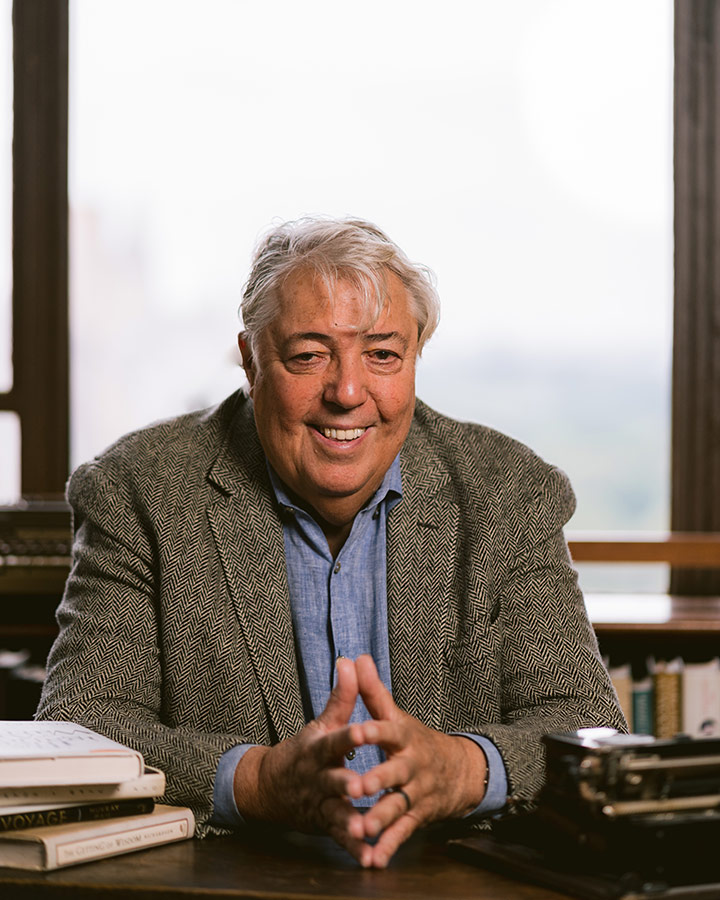
K&R Photos
PRAISE FOR DAVID LAZAR
“Awesome honesty, pacing and reflection. The best book
I’ve read in a long while.”
— SUSAN BRAUDY, PULITZER PRIZE NOMINEE,
AUTHOR OF KICK KENNEDY’S SECRET DIARY
“If David Lazar were a song, it could only be sung by Frank
Sinatra. As a book, it could only have been written by
Robert Kalich. If it’s true that we’re all reduced to stories,
Kalich has told one helluva one! Enjoy the ride.”
— TIM O’MARA, AUTHOR OF
THE RAYMOND DONNE MYSTERY SERIES
“In the hands of a vivid and cinematic storyteller, David
Lazar’s winter-of-life soul search becomes an addictive
journey, leaving the reader to wonder just how much
Kalich has blurred the lines between memoir and fiction.”
— KAREN TINTORI, AUTHOR OF
UNTO THE DAUGHTERS: THE LEGACY OF AN HONOR
KILLING IN A SICILIAN-AMERICAN FAMILY
“David Lazar is a gripping story of choices and their
consequences. It’s worth the journey.”
— IRA BERKOWITZ, SHAMUS AWARD-WINNING AUTHOR OF
THE JACKSON STEEG MYSTERY SERIES
“A truly disturbing look into the mind of a guy who
could live next door—if you happen to live next door to
a professional gambler who works with mobsters and
wealthy businessmen and just happens to be the best
college basketball handicapper in the business.”
— KENNETH WISHNIA, AUTHOR OF
23 SHADES OF BLACK, AND EDITOR OF JEWISH NOIR
“David Lazar is a refreshingly unabashed narrator, and his
memory lane is populated by characters who are, well . . .
characters! A most compelling read!”
— WENDY CORSI STAUB,
NEW YORK TIMES BEST-SELLING AUTHOR
Final Judgment - The late Eliot Asinof's last word on the state of our nation and of the book publishing 'industry'.
Product Code: 006
Final Judgment
By: ELIOT TAGER ASINOF
What happens when an undergraduate at a small New England college tries to stop President George W. Bush from giving the commencement address?
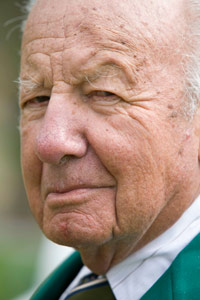 ABOUT THE AUTHOR:
ABOUT THE AUTHOR:
Eliot Tager Asinof was born in Manhattan on July 13, 1919, and grew up there and in Cedarhurst, N.Y. Asinof was best known for one of the top sports books of all time, Eight Men Out, his exhaustively reported reconstruction of the infamous Chicago Black Sox scandal of the 1919 World Series, as well as Man on Spikes, considered perhaps one of the greatest baseball novels ever. Asinof attended Williams College and graduated from Swarthmore College, after which he played minor-league baseball for the Philadelphia Phillies organization. He was the author of five novels and eight works of non-fiction. He wrote numerous screenplays for television and motion pictures and appeared in two John Sayles films, Eight Men Out and Sunshine State. He died in June, 2008, as Final Judgment, his last novel, was going to press.
REVIEWS:
"Eliot Asinof, who brilliantly exposed the rotten roots of the Black Sox Scandal in Eight Men Out, now focuses his scorching light on a corrupt and depraved American political and corporate system. In so doing, he has written a page-turning thriller that works on your mind and on your heart." - Ray Robinson, author of Iron Horse: Lou Gehrig in His Time
"Eliot Asinof’s searing novel—full of rage over what a president has done to our country—creates a heroic young woman who becomes an American Joan of Arc. Final Judgment is one of the most accomplished works of his entire career." - Al Silverman, author of The Time of Their Lives: The Golden Age of Great American Book Publishers, Their Editors, and Authors
Grumbling Hive Revisited
Product Code: 007
AUTHOR: BERNARD MANDEVILLE
Bernard Mandeville’s The Grumbling Hive, or Knaves Turn’d Honest, published in 1705, is an exemplary product of a time when bold thinkers questioned verities that had appeared as solid as cathedrals and palaces: divine rights, sacredness, ‘it is because it is’. It was the beginning of the self-centered age we inhabit, overestimation of self and underestimation of everything else, Ostensibly about bees who "lived like men, and all/ Our actions they performed in small" it was really a fable about western European society. The grumbling in The Grumbling Hive was complaints that the trades and commerce that made the ‘bees’ thrive was everywhere infected by knavery, "sharpers, parasites, pimps, players,/Pickpockets, coiners, quacks, soothsayers. . . All trades and places knew some cheat. No calling was without deceit.” With villainy the norm, the fable device enabled Mandeville to precipitously introduce honesty and to show it freezing the wheels of trade; whole professions, lawyers for example, useless when none desired to obtain something for nothing; and locksmiths unemployed in the absence of burglars. These ideas inspired Adam Smith’s conceptions of supply and demand and the increase of wealth and how these were to be understood in the absence of morality. With confidence in the powers of reason it appeared possible to infer laws from observation, unhallowed laws, like gravity in which mathematical predictability substituted for the supernatural. Smith concluded that the Market, subject to the laws of supply and demand, automatically regulated commerce as if with an Invisible Hand.
As he aged through the 20th century, Mandeville, jr. wondered what his ancestor would have thought of an unregulated laissez faire capitalism that countenanced selling packaged worthless mortgages to pension funds and found usury rather than production of goods the principle source of wealth. It occurred to him to start with bees not as living ‘like men,’ but as bees really exist, seeing the Hive as an example of socialism. In this case, the fable would recount not the introduction of Honesty into laissez-faire capitalism; but the introduction of laissez faire into socialism. He would be turning his ancestor’s fable on its head and perhaps, in the process, stimulate a vision that might alleviate the starvation, waste, environmental degradation and hopelessness of the twenty-first century.
Why bees? Mandeville had a broad purpose and writing about bees lent a fabulous character to the enterprise as had La Fontaine with his fables, the fox and the grapes, for example, magnifying and simplifying motives. 1705: this was. The hinge was the preceding century, during which were scrutinized and mocked. Mandeville’s pamphlet of a dozen or so pages was pirated and sold on the streets of London for a ha’penny, probably equal to about $15 today. He issued new editions every few years, adding prose essays explaining in detail the way dishonesty and vice were necessary to prosperity; but they attracted little attention until his greatly expanded two volume, The Fable of the Bees, appeared in 1723. Now, heard loud and clear, Mandeville’s message generated denunciations in pulpits and parliament. To show the utility of vice, much less praise it, was counter the virtue-extolling message of religion; and Mandeville had gone so far as to condemn Charity Schools for the poor on the ground that it reduced the number of candidates available for the ill-paid dirty work on which the economy thrived. The Fable could not, however, be altogether dismissed. Mandeville had traced not only the fruitful manner in which cheating enhanced the circulation of money; but the way luxury and display created wealth. He saw regulations by government as encouraging monopolies and otherwise distorting trade. Leave it alone, Laissez Faire, was Smith’s watchword. (He did concede that in extreme cases the Market could without some regulation cause starvation and distress; but this has been largely ignored by the economic liberals who followed him, culminating in the so-called Chicago School under Milton Friedman.) A classic disciple of Laissez Faire was treasury secretary Andrew W. Mellon who advocated government inaction during 1930-32 when the great Depression created 25% unemployment.
Socialism, of course, with its public ownership of property, is the opposite of Laissez-Faire capitalism. Paradoxically, however, one cannot find that any capitalist country has Laissez Faire engrained in its constitution or laws. When the United States was formed at the end of Mandeville’s century, a large concern of the 1783 constitutional convention was regulating commerce between the thirteen States that, heretofore, had impoverished each other , causing a constant threat of inter-State wars Article 1 section 3, gives Congress authority to "regulate commerce with foreign nations and among the several States and with the Indian Tribes.” Interpretations over the years have extended this power to affairs within individual states, and the creation of numerous bodies regulating communications, utilities, transportation, working conditions, agriculture, and almost every aspect of the economy.
It Is Always Summer
Product Code: 021
It Is Always Summer
By David Helwig
An author’s note to the new edition of It Is Always Summer
“A novel of relentless sensuality . . . Helwig transforms Kingston into an exotic Venice of the north.”
That quotation is taken from a review of one of my early novels. The review was written by my friend, Matt Cohen. Like too many others, Matt is gone now. But a revised edition of the book he reviewed many years ago has recently appeared, and that started me thinking about the day I first conceived a series of novels about Kingston. It Is Always Summer: its history is a sample of the unpredictable development of a writer’s life.
It was an autumn evening, in 1974 I think, and I was standing on a Toronto street corner. Davenport and Avenue Road. In that period of my life, I was working for CBC TV Drama, hired by the eminent Hungarian-Canadian theatre director, John Hirsch. I passed five days a week in Toronto and spent my weekends with my family in Kingston.
I worked hard in those days, sometimes reading manuscripts long into the evening and then walking the city streets to relax. Publication of The Glass Knight, a novel I’d recently completed, was imminent, and one night, just as I passed the bright lights of the local greengrocer on Avenue Road I suddenly imagined that The Glass Knight might be the first volume of a sequence of fictions about Kingston, Ontario.
Four volumes, I thought. A tetralogy someone would called it. Yes, I’d tackle that challenging sequence. Written over the next couple of years, the earliest editions of the Kingston novels were published by two different publishers. Canadian publishing was in a period of growth, and new writers were appearing from new and exciting publishing houses. The final volume of the tetralogy, It Is Always Summer, was published in 1983 by Stoddart, a division of General Publishing.
And now, more than forty years later, in a new century, my revision of It Is Always Summer, has appeared as an e-book with a small run in paperback.
Here is part of the original cover copy.
“Kingston--a nineteenth century Canadian city built at the edge of a Great Lake--displays a life apparently centered on cathedrals and prisons. At the beginning of It Is Always Summer, a number of characters have converged on the old city during a hot summer in the 1970s. Robert Mallen finds himself still obsessed with a lover he hasn’t seen for ten years. Wayne Burtch and his wife Jane discover the complexities of even the happiest of marriages. The beautiful Elizabeth Ross returns to Canada believing she is a free woman but soon enough finds herself implicated in the intricate and dangerous symphony of desire.”
“This sophisticated novel of manners is . . . set in the environs of Kingston . . . Helwig tells his story through his six elegantly drawn major characters – perceptive individuals all, whose pains and pleasures we feel acutely.” Publishers’ Weekly.
“I . . . enjoyed it immensely. The combination of innocence, lushness and menace held me right through it. It is a fine, true, disturbing book.” Marian Engel
It Is Always Summer was widely and positively reviewed in both Canada and the USA, but as I read the reviews I noticed one or two discerning critics who remarked that the embittered, dangerous Carl Baines was less subtly portrayed than most of the other characters. I kept this thought in mind, and a decade or so later, when all technologies were new and my electric typewriter was replaced by an adaptable digital laptop, I began a selective revision.
“Lurking beneath the languor of palmy summer days, there is a continuing sense of menace . . . This is a novel of many textures and contrasting themes . . . adroitly woven together by Helwig’s wonderful imagery – birds, water, fire, food, earth, even the island itself.” The Toronto Star
Rapid changes in the world--paperback editions, bankruptcies, the founding of more new presses—had the eventual effect of bringing the rights of several books back to me as the original author. The result of all this is the current, revised edition of It Is Always Summer, which is now available as an e-book and a paperback.
“A novel of relentless sensuality . . . Helwig transforms Kingston into an exotic Venice of the north.”
That quotation is taken from a review of one of my early novels. The review was written by my friend, Matt Cohen. Like too many others, Matt is gone now. But a revised edition of the book he reviewed many years ago has recently appeared, and that started me thinking about the day I first conceived a series of novels about Kingston. It Is Always Summer: its history is a sample of the unpredictable development of a writer’s life.
It was an autumn evening, in 1974 I think, and I was standing on a Toronto street corner. Davenport and Avenue Road. In that period of my life, I was working for CBC TV Drama, hired by the eminent Hungarian-Canadian theatre director, John Hirsch. I passed five days a week in Toronto and spent my weekends with my family in Kingston.
I worked hard in those days, sometimes reading manuscripts long into the evening and then walking the city streets to relax. Publication of The Glass Knight, a novel I’d recently completed, was imminent, and one night, just as I passed the bright lights of the local greengrocer on Avenue Road I suddenly imagined that The Glass Knight might be the first volume of a sequence of fictions about Kingston, Ontario.
Four volumes, I thought. A tetralogy someone would called it. Yes, I’d tackle that challenging sequence. Written over the next couple of years, the earliest editions of the Kingston novels were published by two different publishers. Canadian publishing was in a period of growth, and new writers were appearing from new and exciting publishing houses. The final volume of the tetralogy, It Is Always Summer, was published in 1983 by Stoddart, a division of General Publishing.
And now, more than forty years later, in a new century, my revision of It Is Always Summer, has appeared as an e-book with a small run in paperback.
Here is part of the original cover copy.
“Kingston--a nineteenth century Canadian city built at the edge of a Great Lake--displays a life apparently centered on cathedrals and prisons. At the beginning of It Is Always Summer, a number of characters have converged on the old city during a hot summer in the 1970s. Robert Mallen finds himself still obsessed with a lover he hasn’t seen for ten years. Wayne Burtch and his wife Jane discover the complexities of even the happiest of marriages. The beautiful Elizabeth Ross returns to Canada believing she is a free woman but soon enough finds herself implicated in the intricate and dangerous symphony of desire.”
“This sophisticated novel of manners is . . . set in the environs of Kingston . . . Helwig tells his story through his six elegantly drawn major characters – perceptive individuals all, whose pains and pleasures we feel acutely.” Publishers’ Weekly.
“I . . . enjoyed it immensely. The combination of innocence, lushness and menace held me right through it. It is a fine, true, disturbing book.” Marian Engel
It Is Always Summer was widely and positively reviewed in both Canada and the USA, but as I read the reviews I noticed one or two discerning critics who remarked that the embittered, dangerous Carl Baines was less subtly portrayed than most of the other characters. I kept this thought in mind, and a decade or so later, when all technologies were new and my electric typewriter was replaced by an adaptable digital laptop, I began a selective revision.
“Lurking beneath the languor of palmy summer days, there is a continuing sense of menace . . . This is a novel of many textures and contrasting themes . . . adroitly woven together by Helwig’s wonderful imagery – birds, water, fire, food, earth, even the island itself.” The Toronto Star
Rapid changes in the world--paperback editions, bankruptcies, the founding of more new presses—had the eventual effect of bringing the rights of several books back to me as the original author. The result of all this is the current, revised edition of It Is Always Summer, which is now available as an e-book and a paperback.
Mendel Rosenbusch - Tales for Jewish Children
Product Code: 008
AUTHOR: ISLE WEBER
Translated from the German by Hans and Ruth Fisher
Publication Date: October 11, 2012
Mendel Rosenbusch lives in a small house behind the synagogue in a rural village. All the children love Mendel – he always has a bowl of delicious baked goods when they visit him on the Sabbath. Decent, friendly people love Mendel without knowing what makes him so likeable; while stingy, unfriendly people frown at him without knowing why. Mendel Rosenbusch seems to know everything, and he has a wonderful gift for reading in people’s eyes their most secret thoughts. You see, Mendel has a secret. One night an angel appeared and gave him ma magic coin. When Mendel puts it in his pocket, he becomes invisible. That was the wonderful gift God gave him for being so kind-hearted.
Do you wonder what Mendel Rosenbusch does with his magic invisibility?
THE STORY BEHIND THIS TRANSLATION:
First published in Czechoslovakia in 1929, these tales would have been forgotten had not an elderly New Jersey couple not come across a crumbling copy in a library in Santiago, Chile. Dr. Hans Fisher, a professor of biochemistry at Rutgers University, and his wife, Ruth, were in Santiago following the death of Ruth’s mother. As Dr. Fisher recalls, "The book was slim and gray, and, judging by its condition, I had gotten to it just in time. Portions of the cover, pages, and binding had been devoured by mice, insects, or both, but the title could still be read: Mendel Rosenbusch: Geschichten für Jüdische Kinder, or, in English, Mendel Rosenbusch: Tales for Jewish Children. Opening the cover, seeing again the stories flowing across the pages, transported me to my own boyhood in Breslau and the memories that could not have been contained in the book: Adolf Hitler passing below our family’s apartment in a motorcade; my friends and I suffering beatings from Nazi youth; my family fleeing the approaching Holocaust aboard the ill-fated St. Louis; the months in a French camp for refugee children. It seemed like a small miracle that I had found this particular book, and, over the next few hours, I devoured its contents as if in a trance. The charm, insight, and moral grounding that had made it one of my favorites more than a half-century earlier were just as I remembered.
Within days, I was retelling such tales as ‘Uri, the Rascal,’ ‘Baruch, the Benefactor’ and ‘Simche, the Liar’ to my visiting grandchildren."
A long search for the author, Ilse Herlinger, revealed that she had become Ilse Weber upon marriage in 1930, and that after two years in the Theresienstadt Concentration camp (1942-4), she and her younger son Thomas had been transported to Auschwitz, where they were murdered. In 1946, her husband Willy, who had survived Auschwitz, and their elder son Hanus, who had been sent to live with friends abroad, dug up at Theresienstadt the manuscripts of songs Ilse had written, where Willy had buried them. Ilse’s Theresen songs have been recorded by several artists, including Anne-Sophie von Otter and Bjent Kahane.
ABOUT THE TRANSLATORS:
Both Hans and Ruth Fisher and their families escaped from Nazi Germany. Hans was born in Breslau, Germany (now Wroclaw, Poland) on March 4, 1928. Trying to emigrate since 1937, Hans’ father, after incarceration in Buchenwald concentration camp, finally obtained a visa to Cuba.
The rest of the family, Hans, his sister and mother, after crossing the Atlantic and being returned to Europe on the well-known ill-fated voyage of the St . Louis, eventually, joined Hans’ father in Havana, Cuba. From there, in early 1941, they all gained entry to the U.S., where the Baron Hirsch foundation settled them on a poultry farm in Vineland, NJ. Hans attended Rutgers University and the University of Illinois before returning to the Rutgers faculty where he had a distinguished career as professor of nutritional biochemistry.
Ruth Hirshberg Fisher was also born in Breslau, the daughter and grand-daughter of judges. Because his brother had emigrated to Chile three years before, Ruth’s father was able to get visas for his family. In Santiago, Ruth studied violin and recorder.After marrying Hans and emigrating to the U.S. in 1950, Ruth qualified herself as an accomplished chamber-music performer at the University of Illinois Champaigne-Urbana. Her love of music has been transmitted to her three children and ten grand-children, who sing, and perform on violin, cello, and piano.
ABOUT THE ARTIST:
P. John Burden was trained as a copper plate line engraver and painter, etc. at the City & Guilds, London, U.K.As well as being a prolific painter with work in collections worldwide, he has illustrated many books. Mr. Burden found Mendel a difficult assignment. "Such dark times were ahead, especially for Jews;” he writes, "But then I remembered a friend, Ariah, telling me that it was everyone’s responsibility to try to bring some light into this world - and that, of course, is exactly what Ilse had done! "So I drew the illustrations as dark, with always a light shining through!”
ABOUT THE DESIGNER:
Henry Dunsmore graduated in graphic and package design from Sheridan College in Oakville, Ontario. He worked with the Art Gallery of Ontario for 20 years in photography, graphic design, film and video production before moving to Prince Edward Island.
REVIEWS:
"My only gripe with these folktales is the title. If they are just for Jewish children, that leaves out about 98 percent of children in the United States. And this collection of stories, originally published in Germany early in the twentieth century and translated into English, by Ruth Hirschberg Fisher and her husband, Dr. Hans Fisher, should be enjoyed by all.
They are tales of Jewish life in the old country. They tell of a life in villages that no longer exists, long wiped out by pogroms and the Holocaust. They are sweet stories, which offer valuable lessons." - Jacqueline Cutler, Newark Star Ledger
"These stories do more than that—they teach about Judaism and its traditions and remind us of our rich heritage and who we are. Whether we are baking “Shabbos Challah” or listening to the Megillah at Purim, we get a strong sense of unity knowing that we are not alone and that people all over the world bake “Shabbos Challah” and make noise when Haman’s name is mentioned. And as I said, these are not stories just for children but for all of us who want to know our pasts.
The illustrations by P. John Burden are wonderful and with them the book becomes visual. As years pass, the world of the Jews of eastern Europe pass with them and if it were not for books like this, it would be gone forever. Just to give you an idea about relevant these stories are, I found myself being taken back to my childhood and listening to my parents tell me these stories. They are universal and have stood the test of time. They seem to eschew being dated and remind us that doing good deeds never goes out of style. The book is more than stories; it is an experience and a guide to a world that will never be again which was an important thread in the quilt of Jewish history. So often we learn about the Holocaust but not of the world that existed before the genocide of the 6,000,000. We need to know about that world and here is a way of doing so." - Amos Lassen
"Ruth and Hans Fischer’s work is the very worth-while result of all their efforts, bringing not just the stories but Ilse Weber herself to a new generation of children and to the adults who read the stories to them. Read more" - Gila Wertheimer
"Mendel Rosenbusch: Tales for Jewish Children, is the finest children's book I've ever read... It is a beautiful combination of fantasy and instruction. Every moral point a parent would like to teach his child is here; the literary wrapping is entrancing. Read more" - Hillel Goldberg
"The stories are delightful, each with a moral lesson but one not didactically delivered. Ruth and Hans Fisher are to be commended for translating this literary treasure chest and partnering it with the gorgeous illustrations of P. John Burden. Children aged four through nine will definitely enjoy these stories, particularly when they are patiently read out loud by the right adult. Read more" - Lauren Kramer
Oblomov
Product Code: 018
Oblomov
By IVAN GONCHAROV
Translated by Stephen Pearl
Awarded the 2008 AATSEEL Prize for best translation
from Slavic language to English
ATSEEL is the Association of Teachers of Slavic
and Eastern European Languages
Introduction by Galya Diment
Foreword by Tatyana Tolstaya
What happens when a loveable, indolent man falls in love? A classic of world literature.
Even though Ivan Goncharov wrote several books that were widely read and discussed during his lifetime, today he is remembered for one novel, Oblomov, published in 1859, an indisputable classic of Russian literature, the artistic stature and cultural significance of which may be compared only to other such masterpieces as Nikolai Gogol’s Dead Souls, Leo Tolstoy's Anna Karenina, and Fyodor Dostoevsky's Brothers Karamazov.
Stephen Pearl's new translation, the first major English-language publication of Oblomov in more than fifty years, succeeds exquisitely in introducing this astonishing and endearing novel to a new generation of readers. Rich in situational comedy, psychological complexity, social satire, and incisive depictions of class, ethnicity, and sexuality, Oblomov is clearly a novel that was written for all time.
Stephen Pearl (translator) was a simultaneous interpreter at the United Nations for more than thirty years and was Chief of English Interpretation there for fifteen years. He is a graduate of St. John’s College, Oxford University with an M.A. in Classics.
Galya Diment (Introduction) is Professor and Chair of the Slavic Languages and Literatures department at the University of Washington, Seattle. She is the author of Pniniad: Vladimir Nabokov and Marc Szeftel (University of Washington) and the Autobiographical Novel of Co-Consciousness: Goncharov, Woolf, and Joyce (University Press of Florida). She edited Goncharov's Oblomov: A Critical Companion (Northwestern).
Tatyana Tolstaya (Foreword) is a Russian short-story writer, essayist, novelist, and greatgrandniece of Leo Tolstoy. Her translated collections include On the Golden Porch (1990) and Sleepwalker in a Fog (1992), stories, and Pushkin's Children: Writings on Russia and Russians (2003), essays.
- Alternate selection of the Readers’ Subscription Book Club
- Adopted at undergraduate and graduate levels —
a definitive academic edition Russian Literature 6 x 9, 472 pages
REVIEWS:
"[Goncharov] is ten heads above me in talent." - Anton Chekov
"Oblomov is a truly great work, the likes of which one has not seen for a long, long time I am in rapture over Oblomov and keep rereading it." - Leo Tolstoy
"A deep warm bath of a book, something you can slip down into silently and fall gently through its pages until you are drowsy with pleasure... It's a longish book, but it’s not heavy-going thanks to a new translation by Stephen Pearl." - Michael Enright, Canadian Broadcasting’s Sunday Edition
"A new translation, a snappily colloquial and readable one, has just been published..." - Joseph N. Frank, The New Republic
"This is an excellent translation... I have no hesitation recommending it... Pearl's rendering is fluid, elegant, and witty, and it is a great relief to have a replacement for the 1954 translation by David Margarshack, which is dated." - Barbara Henry, University of Washington
"A fine new translation." - Michael Dirda, Washington Post Book World
"Though it would be absurd to expect that Pearl has unveiled a new Oblomov—one that significantly alters the reader's view of Goncharov's masterpiece—this translation clearly surpasses its predecessors. Eschewing the dangerous "be-literal-at-all-costs" principle observed by some translators, Pearl offers a consistently smooth, supple, and idiomatic rendition of the novel—a version that preserves the "spirit" of the original Russian text. Summing up: Highly recommended. All readers; all levels." - R. Gregg, emeritus, Vassar College, Choice Magazine
"Stephen Pearl's translation is by far the best I've read... it boasts a livelier, more contemporary idiom while it faithfully reproduces Goncharov's 19th-century Russian." - John Givens, university of Rochester
"Marvelously translated by Stephen Pearl without sounding overwhelmingly British or American." - Keith Garebian, The Globe & Mail
"Beautiful new edition and translation..." - Carlin Romano, Philadelphia Inquirer
Oblomov
Product Code: 009
Oblomov
By IVAN GONCHAROV
Translated by Stephen Pearl
Awarded the 2008 AATSEEL Prize for best translation
from Slavic language to English
ATSEEL is the Association of Teachers of Slavic
and Eastern European Languages
Introduction by Galya Diment
Foreword by Tatyana Tolstaya
What happens when a loveable, indolent man falls in love? A classic of world literature.
Even though Ivan Goncharov wrote several books that were widely read and discussed during his lifetime, today he is remembered for one novel, Oblomov, published in 1859, an indisputable classic of Russian literature, the artistic stature and cultural significance of which may be compared only to other such masterpieces as Nikolai Gogol’s Dead Souls, Leo Tolstoy's Anna Karenina, and Fyodor Dostoevsky's Brothers Karamazov.
Stephen Pearl's new translation, the first major English-language publication of Oblomov in more than fifty years, succeeds exquisitely in introducing this astonishing and endearing novel to a new generation of readers. Rich in situational comedy, psychological complexity, social satire, and incisive depictions of class, ethnicity, and sexuality, Oblomov is clearly a novel that was written for all time.
Stephen Pearl (translator) was a simultaneous interpreter at the United Nations for more than thirty years and was Chief of English Interpretation there for fifteen years. He is a graduate of St. John’s College, Oxford University with an M.A. in Classics.
Galya Diment (Introduction) is Professor and Chair of the Slavic Languages and Literatures department at the University of Washington, Seattle. She is the author of Pniniad: Vladimir Nabokov and Marc Szeftel (University of Washington) and the Autobiographical Novel of Co-Consciousness: Goncharov, Woolf, and Joyce (University Press of Florida). She edited Goncharov's Oblomov: A Critical Companion (Northwestern).
Tatyana Tolstaya (Foreword) is a Russian short-story writer, essayist, novelist, and greatgrandniece of Leo Tolstoy. Her translated collections include On the Golden Porch (1990) and Sleepwalker in a Fog (1992), stories, and Pushkin's Children: Writings on Russia and Russians (2003), essays.
- Alternate selection of the Readers’ Subscription Book Club
- Adopted at undergraduate and graduate levels —
a definitive academic edition Russian Literature 6 x 9, 472 pages
REVIEWS:
"[Goncharov] is ten heads above me in talent." - Anton Chekov
"Oblomov is a truly great work, the likes of which one has not seen for a long, long time I am in rapture over Oblomov and keep rereading it." - Leo Tolstoy
"A deep warm bath of a book, something you can slip down into silently and fall gently through its pages until you are drowsy with pleasure... It's a longish book, but it’s not heavy-going thanks to a new translation by Stephen Pearl." - Michael Enright, Canadian Broadcasting’s Sunday Edition
"A new translation, a snappily colloquial and readable one, has just been published..." - Joseph N. Frank, The New Republic
"This is an excellent translation... I have no hesitation recommending it... Pearl's rendering is fluid, elegant, and witty, and it is a great relief to have a replacement for the 1954 translation by David Margarshack, which is dated." - Barbara Henry, University of Washington
"A fine new translation." - Michael Dirda, Washington Post Book World
"Though it would be absurd to expect that Pearl has unveiled a new Oblomov—one that significantly alters the reader's view of Goncharov's masterpiece—this translation clearly surpasses its predecessors. Eschewing the dangerous "be-literal-at-all-costs" principle observed by some translators, Pearl offers a consistently smooth, supple, and idiomatic rendition of the novel—a version that preserves the "spirit" of the original Russian text. Summing up: Highly recommended. All readers; all levels." - R. Gregg, emeritus, Vassar College, Choice Magazine
"Stephen Pearl's translation is by far the best I've read... it boasts a livelier, more contemporary idiom while it faithfully reproduces Goncharov's 19th-century Russian." - John Givens, university of Rochester
"Marvelously translated by Stephen Pearl without sounding overwhelmingly British or American." - Keith Garebian, The Globe & Mail
"Beautiful new edition and translation..." - Carlin Romano, Philadelphia Inquirer
Our Lady Of Steerage
Product Code: 010
Our Lady Of Steerage
BY: STEVEN MAYOFF
"The present moment is unlike the memory of it. Remembering is not the negative of forgetting. Remembering is a form of forgetting.”
This quote by Milan Kundera sets the tone for the story of 19 year old Mariasse Knyszinski, who, in 1923, has run away from her home in Kraków to be with her cousin, Piotr, in Montreal.
Aboard the S. S. Montmartre she meets a young Jewish couple, Shulim and Betye, who have suffered the loss of their 5 year old son. Betye’s grief is such that she ignores their infant daughter, Dvorah, so Mariasse takes care of her for the duration of the voyage.
The Madonna-like image of Mariasse carrying Dvorah around on the ship inspires the other 3rd class passengers to refer to her as Our Lady of Steerage.
This begins a visceral connection between Mariasse and Dvorah and for the next 40 years they wander in and out of each other’s lives, their relationship weathering both fierce devotion and bitter betrayals.
The non-linear narrative and image-driven prose of Our Lady Of Steerage manifests the novel’s chief themes: the vagaries of memory and the struggle for self-reinvention.
Adult readers who are looking for psychological insight and emotional complexity will be drawn in by Mariasse’s personal journey that takes her from her Catholic upbringing to her eventual conversion to Judaism and ultimate return to Catholicism.
How this full circle mirrors Dvorah’s lifelong struggle with manic-depression illuminates the shadowy divide between the mind and the soul, only to reveal the beating heart that continually brings together and drives apart these two women.
ABOUT THE AUTHOR:
Steven Mayoff was born and raised in Montreal, lived in Toronto for 17 years and has been writing full time in the bucolic splendour of western Prince Edward Island since 2001. His fiction and poetry have appeared in literary journals across Canada and the U.S., as well as in Ireland, France and Algeria.
His story collection, Fatted Calf Blues, won a 2010 PEI Book Award, was short-listed for a 2010 Re-Lit Award and was a Top 5 Finalist for the 2011 CBC Cross-Country Bookshelf (Maritime division). It was praised in the Globe & Mail as showing "a strong imagination at work.”
He has collaborated on short radio plays for CBC and on a stage play, Bully, which was produced at the Theatre Centre in Toronto in 2001. He received a nomination for a Dora Mavor Moore Award as lyricist for the musical, SwingStep, which was staged at the Ford Centre in North York in 1999.
As a librettist he has written a rock musical, Dorian, with composer Ted Dykstra and a short chamber opera, Milk Bar, with composer Jim O’Leary, which was performed as a student production at Mount Allison University in 2014. He is currently working on a full-length opera, Sikutopia, with Greenlandic composer, Arnannguaq Gerstrøm.
He is also completing a poetry collection, Red Planet Postcards, to be published in 2016. Our Lady Of Steerage is his first novel. His web site is www.stevenmayoff.ca
Seizing the Ivy
Product Code: 023
Seizing the Ivy. A Pompey Tale
By: Barbara Parsons
Ivy on the warpath!
A veteran ward sister and nurse, Ivy Maude Gorwick survived years of bicycling to work in
a blacked-out city beneath the flak-rattled night skies of World War Two. She now anticipates a respite from years of hard work and lonely widowhood as a resident of The Glebe Repose,
a modish elderly care facility.
But things are not as they seem, and there are still battles to be won. Ivy fights for her convictions with dignity against bureaucrats and bunglers.
At once poignant and humorous, this is the touching story of a proud woman’s painful adjustments to the realities of aging, changing standards, and mother-daughter misapprehensions.
Barbara P. Parsons was born in Portsmouth, England, to a naval family. After working overseas in many different lands, she came to the U.S. with her American husband in 1973. She presently resides in Prince Edward Island, Canada. She was active for many years in green and animal liberation issues, and contributed articles to Sierra Club’s Wildlife Involvement News and edited the UFETA (Unitarians for Ethical Treatment of Animals) newsletter. Her novel, Beulah Kettlehole and the Patriarchal Ice, was first published in 2001 by the Writers Club Press and reprinted in 2016 by Bunim and Bannigan.
Author photograph by Sandra MacDonald
Cover illustration by Aidan Searle, Egg Creative eggcreative.ca


